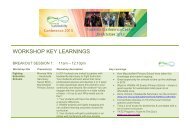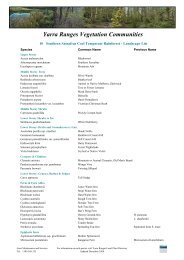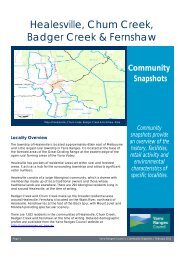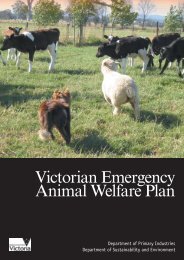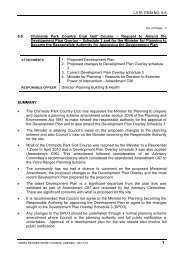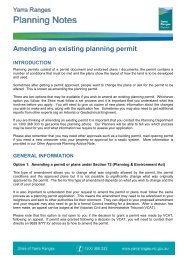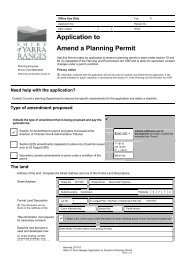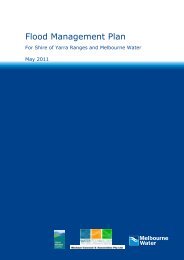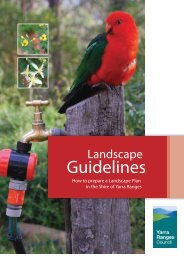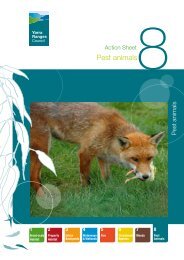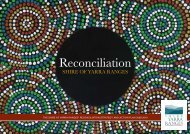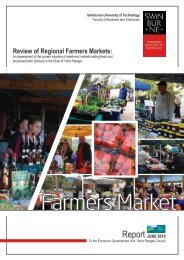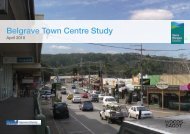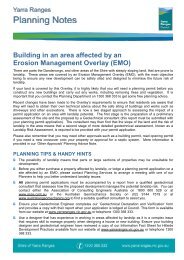Reconciliation Framework - Shire of Yarra Ranges
Reconciliation Framework - Shire of Yarra Ranges
Reconciliation Framework - Shire of Yarra Ranges
- No tags were found...
Create successful ePaper yourself
Turn your PDF publications into a flip-book with our unique Google optimized e-Paper software.
Painted By: Safina Stewart<strong>Yarra</strong> <strong>Ranges</strong><strong>Reconciliation</strong> <strong>Framework</strong>for Action 2013 - 2023www.yarraranges.vic.gov.au
pCari ng--tceAccessParticipationHealth, Healingand SpiritAccessParticipationShStrengthening &Cultural HeritageseRKinshipFamily KinshipLanguage<strong>of</strong> KnowingIndigenous WaysCountryArt & CultureSpiritualityar ingAcknowledgement <strong>of</strong> CountryWe respectfully acknowledge the Traditional Owners, the Wurundjeri People, as the custodians <strong>of</strong> this land. We also pay respect to allAboriginal community Elders, past and present who have resided in the area and have been an integral part <strong>of</strong> the history <strong>of</strong> this region.
<strong>Yarra</strong> <strong>Ranges</strong><strong>Reconciliation</strong> <strong>Framework</strong>for Action 2013 - 2023www.yarraranges.vic.gov.au
ContentsMayor’s Message 6Our Vision for <strong>Reconciliation</strong> 7Strategic <strong>Framework</strong> <strong>Yarra</strong> <strong>Ranges</strong> Council 8Key Policies and Plans 9Municipal Public Health and Wellbeing Plan 9State, Federal and International Contexts 10Indigenous Advisory Committee 11Strengthening Culture 11<strong>Reconciliation</strong> Action Plan 12Annual Action Planning 13Themes for Action 13<strong>Reconciliation</strong> Policy 14Notes 18
Mayor’s MessageCr Jim ChildIt is with pleasure that I present the <strong>Yarra</strong> <strong>Ranges</strong> Council <strong>Reconciliation</strong><strong>Framework</strong> for Action 2013-2023. This framework outlines Council’skey strategic <strong>Reconciliation</strong> directions for the next ten years. The <strong>Yarra</strong><strong>Ranges</strong> Indigenous Advisory Committee has guided the development <strong>of</strong>Council’s <strong>Reconciliation</strong> approach, based on Indigenous ways <strong>of</strong> knowingand respect, caring and sharing. This innovative and creative approach, asdescribed by the Indigenous Advisory Committee, “captures the corevalues and elements <strong>of</strong> local Aboriginal culture; acknowledging andunderstanding the way contemporary urban Aboriginal communities seethe world”.This framework builds on the <strong>Yarra</strong> <strong>Ranges</strong> <strong>Reconciliation</strong> Strategyand Action Plan 2008-2010 and demonstrates Council’s continuingcommitment to the process <strong>of</strong> <strong>Reconciliation</strong>. We continue to provideleadership across sectors and support to our partners in governmentand community organisations. <strong>Yarra</strong> <strong>Ranges</strong> is proud <strong>of</strong> its long historyin <strong>Reconciliation</strong> and commitment to our Aboriginal community throughCouncil’s vision “for a united community that recognises the specialplace and culture <strong>of</strong> Indigenous peoples as first Australians, values theirparticipation and provides equal life chances for all”.I would like to take this opportunity to thank both past and presentmembers <strong>of</strong> Council’s Indigenous Advisory Committee for theircommitment and passion over ten years in guiding <strong>Reconciliation</strong> in <strong>Yarra</strong><strong>Ranges</strong>. Our <strong>Reconciliation</strong> <strong>Framework</strong> for Action sets a new benchmarkfor <strong>Reconciliation</strong> in local government. It is with a sense <strong>of</strong> enthusiasm andpride that I look forward to making my contribution towards “a pathway tohealing the past and moving forward toward a future <strong>of</strong> respect, caring andsharing with all cultures living in harmony”.6Cr Jim ChildMayor
Our Vision for <strong>Reconciliation</strong><strong>Yarra</strong> <strong>Ranges</strong> Council’s Indigenous Advisory Committee (IAC) has defined <strong>Reconciliation</strong> as:“a pathway to healing the past and moving forward toward a future <strong>of</strong> respect, caring and sharing with all cultures living in harmony”.Council’s <strong>Reconciliation</strong> Policy includes a vision:“for a united community that recognises the special place and culture <strong>of</strong> Indigenous peoples as first Australians, values their participation andprovides equal life chances for all”.<strong>Reconciliation</strong> is fundamental to healing past injustices towards Indigenous people, and is vital to community health and wellbeing.<strong>Yarra</strong> <strong>Ranges</strong> Council supports the rights <strong>of</strong> all Indigenous people, as outlined in the United Nations Declaration on the Rights <strong>of</strong>Indigenous People which sets out their rights to:• culture, identity, language, employment, health and education• maintain and strengthen institutions, cultures and traditions• pursue development in keeping with Indigenous needs and aspirations• full and effective participation• pursue Indigenous visions <strong>of</strong> economic and social development.Our local vision is for a united community that recognises the special place and culture <strong>of</strong> Indigenous peoples as first Australians, values theirparticipation, and provides equal life chances for all.<strong>Yarra</strong> <strong>Ranges</strong> has three key components that guide Council’s commitment to <strong>Reconciliation</strong>. These are:• the <strong>Reconciliation</strong> Policy• the <strong>Reconciliation</strong> <strong>Framework</strong> for Action• a Background Paper outlining the partnership approach taken by the IAC and Council to achieving <strong>Reconciliation</strong>.7
econciliation8Strategic <strong>Framework</strong> <strong>Yarra</strong> <strong>Ranges</strong> CouncilThe context for the policy and action plan is provided by Council’s Strategic <strong>Framework</strong>.Council has identified five strategic objectives to describe what we are working towards –how we want <strong>Yarra</strong> <strong>Ranges</strong> to be in the future. The objectives take into account emergingcommunity needs, expectations and levels <strong>of</strong> satisfaction with Council services.The <strong>Reconciliation</strong> <strong>Framework</strong> for Action is primarily linked to the strategic objective <strong>of</strong>Active and Engaged Communities objective; however, it also has connections to the otherobjectives.The <strong>Reconciliation</strong> themes for action will influence work across Council, with ourcommitment to <strong>Reconciliation</strong> captured in annual actions for Council departments.
Key Policies and PlansThe <strong>Yarra</strong> <strong>Ranges</strong> <strong>Reconciliation</strong> <strong>Framework</strong> for Action draws on a range <strong>of</strong> other Council policies and plans including the:• <strong>Yarra</strong> <strong>Ranges</strong> Council Plan• <strong>Yarra</strong> <strong>Ranges</strong> Community Wellbeing Plan (MPHWP)• <strong>Yarra</strong> <strong>Ranges</strong> Council <strong>Reconciliation</strong> Policy (see appendix 1)• <strong>Yarra</strong> <strong>Ranges</strong> Municipal Strategic Statement• <strong>Yarra</strong> <strong>Ranges</strong> Disability Action Plan 2013-2017Other guiding documents in the development <strong>of</strong> the Plan included:• <strong>Yarra</strong> <strong>Ranges</strong> Council: Indigenous Advisory Committee Cultural Respect Protocols• <strong>Yarra</strong> <strong>Ranges</strong> Council: Indigenous Advisory Committee Terms <strong>of</strong> ReferenceMunicipal Public Health and Wellbeing PlanAll Councils have a statutory responsibility to protect and enhance the health and wellbeing <strong>of</strong> their communities. Planning for health and wellbeingin <strong>Yarra</strong> <strong>Ranges</strong> includes an understanding <strong>of</strong> the determinants <strong>of</strong> health (the underlying and systemic causes <strong>of</strong> poor health) identified by the WorldHealth Organisation. These include education, employment, housing, economic participation, transport, gender, the environment, social inclusion,violence, health literacy (the ability to understand health information) and power over decision making.In the context <strong>of</strong> <strong>Reconciliation</strong> it is important to consider the determinants, as they point to areas for improvement and action in order to see healthgains in Indigenous communities. <strong>Yarra</strong> <strong>Ranges</strong> Council regards <strong>Reconciliation</strong> as vital to community health and wellbeing.9
10reconciliationState, Federal & International ContextsThe <strong>Yarra</strong> <strong>Ranges</strong> <strong>Reconciliation</strong> priorities align with the following International,State and Commonwealth policies and frameworks:• United Nations; Declaration on the Rights <strong>of</strong> Indigenous People• Commonwealth <strong>of</strong> Australia: Social Inclusion Agenda• Council Of Australian Governments: Close the Health Gap Initiative• Victorian Government: Aboriginal Inclusion <strong>Framework</strong>• Koolin Balit: Victorian Government strategic directions for Aboriginal health• Victorian Charter <strong>of</strong> Human Rights• Dardee Boorai: Victorian Charter <strong>of</strong> Safety and Wellbeing for Aboriginal Children andYoung People• Vic Health: Life is Health is Life, Health Promotion Strategy• Victorian Government Aboriginal Affairs <strong>Framework</strong>• Kameeta Yirramboi: Victorian Government Aboriginal Employment Strategy
Indigenous Advisory CommitteeThe <strong>Yarra</strong> <strong>Ranges</strong> Indigenous Advisory Committee (IAC) was established in 2005 and is central to driving <strong>Reconciliation</strong> in <strong>Yarra</strong> <strong>Ranges</strong>. The IAC andCouncil have worked together to develop the <strong>Reconciliation</strong> Policy and the <strong>Reconciliation</strong> <strong>Framework</strong> for Action. The IAC has a strong commitmentto improving Indigenous health and wellbeing in <strong>Yarra</strong> <strong>Ranges</strong>. It facilitates ongoing engagement and partnering between the Indigenous communityand Council. It supports improving access to culturally appropriate services by raising awareness <strong>of</strong> Indigenous history, culture, needs and issues aswell as recognising community strengths. The IAC acknowledges that healing needs to happen not only between Indigenous and non-Indigenouspeoples but within the Indigenous community.Strengthening Culture‘Culture is fundamental to identity - it is our past, our present and our future... We need our culture to sustain us and to keep us well. Butimportantly, we need culture because it tells us who we are.’Tom Calma, Aboriginal and Torres Strait Islander Social Justice CommissionerThe IAC and Council recognise that strategies to create and strengthen social and economic participation need to be underpinned by a strong culturalframework and led by the Indigenous community.The work <strong>of</strong> the IAC over many years has highlighted the importance <strong>of</strong> understanding the positive effects on Indigenous health and wellbeing <strong>of</strong> acultural strengthening approach. The IAC has emphasised the need to recognise the contemporary culture <strong>of</strong> Indigenous people, as well as the vasthistory and heritage <strong>of</strong> Indigenous culture. This view is supported by IAC members’ experience <strong>of</strong> cultural practice, research, and reflection on thecritical role that culture has on both individual and community identity. The resilience <strong>of</strong> local Indigenous peoples, including their connections to theirculture, is a strength that will be enhanced through this Plan.11
12reconciliation<strong>Reconciliation</strong> <strong>Framework</strong> for ActionThe <strong>Reconciliation</strong> <strong>Framework</strong> for Action outlines Council’s commitment to the process<strong>of</strong> <strong>Reconciliation</strong>. It states what we will do in partnership with the IAC, community andservices to advance <strong>Reconciliation</strong> and to reduce the gap in Indigenous participation.Working with the strengths <strong>of</strong> the community we will promote resilience and independence.The <strong>Framework</strong> is guided by Council’s <strong>Reconciliation</strong> Policy.The values <strong>of</strong> Respect, Caring and Sharing underpin the way that we will work to achievethe goals <strong>of</strong> the <strong>Framework</strong>. The values were developed in partnership with the IAC andlocal Elders.The <strong>Reconciliation</strong> <strong>Framework</strong> for Action:• recognises Council’s role in advocating for its community and working with its partners,community and other levels <strong>of</strong> government, to achieve the benefits <strong>of</strong> <strong>Reconciliation</strong>.• reflects Council’s specific roles and responsibilities• seeks to achieve incremental change in areas within its control and to influence changethrough leadership and community development activities• includes work which will be undertaken across the many roles <strong>of</strong> Council and providesaccountability through measurable actions• seeks to improve equal access to civil society, and to economic and social participation• provides a platform to raise awareness broadly in the community, and to promote thepositive contribution <strong>of</strong> Indigenous people and culture in <strong>Yarra</strong> <strong>Ranges</strong>• acknowledges the importance <strong>of</strong> working with key stakeholders and partners. Forexample, through networking, facilitation, better coordination, and collaboration• acknowledges the centrality <strong>of</strong> Indigenous self determination and control in healingand <strong>Reconciliation</strong>.
Annual Action PlanningOver the life <strong>of</strong> the <strong>Reconciliation</strong> <strong>Framework</strong> for Action, specific actions will be developed each year to outline how we will work to achieve our<strong>Reconciliation</strong> goals. The annual actions will describe tangible outcomes for the <strong>Yarra</strong> <strong>Ranges</strong> community.Implementation <strong>of</strong> the annual actions will depend on theparticipation <strong>of</strong> a range <strong>of</strong> internal and external partners.For examplesservice areas within Council, governmentdepartments, local service providers, Indigenousorganisations and agencies. The annual actions willidentify shared goals with our partners and how we willachieve these goals.The annual actions will also articulate indicators <strong>of</strong> success(desired outcomes) and identify who will lead each action.Both Council and the IAC will receive annual reports onprogress.Themes for ActionCouncil and the IAC have developed key themes for annualplanning which will build the foundation for ongoing worktowards <strong>Reconciliation</strong>. Advocacy is noted as a keycomponent and role across the themes outlined in theadjoining chart:Health, Healing and Spirit* Improve Indigenous Health and Wellbeing through recognising andacknowledging the legacy <strong>of</strong> cultural loss and engaging in healing byreclaiming cultural practice and identity.Participation* Increase Indigenous voices in contemporary society and community lifeService Access* Improve service access including access to Council services for Indigenous familiesStrengthening Cultural Heritage* Publicly acknowledge and respect Indigenous culture and heritage in <strong>Yarra</strong> <strong>Ranges</strong>a d v o c a c y13
<strong>Reconciliation</strong> Policy1. STATEMENT OF INTENT<strong>Yarra</strong> <strong>Ranges</strong> Council recognises <strong>Reconciliation</strong> as vital to community health and wellbeing.Council is committed to strengthening <strong>Reconciliation</strong> through supporting Indigenouscommunities and cultural development. Council’s Indigenous Advisory Committee (IAC)has determined our local definition <strong>of</strong> <strong>Reconciliation</strong> to be:“A pathway in healing the past and moving forward toward a future <strong>of</strong> respect, caringand sharing with all cultures living in harmony”.In accordance with the practice and principles <strong>of</strong> cultural respect, Council opens everyoccasion <strong>of</strong> significance with an Acknowledgement <strong>of</strong> Country and Indigenous CommunityElders. The opening greeting used at Council was developed and approved by the IAC,as follows:Acknowledgement <strong>of</strong> Country and Our Community EldersWe respectfully acknowledge the Traditional Owners, the Wurundjeri People, as theCustodians <strong>of</strong> this land. We also pay respect to all Aboriginal community Elders, past andpresent, who have resided in the area and have been an integral part <strong>of</strong> the history <strong>of</strong> thisregion.14
2. COUNCIL’S VISION FOR RECONCILIATIONCouncil supports the rights <strong>of</strong> all Indigenous People as outlined in the United Nations Declaration on the Rights <strong>of</strong> Indigenous People. Our local visionis for a united community that recognises the special place and culture <strong>of</strong> Indigenous peoples as first Australians, values their participation, andprovides equal life chances for all.3. STATEMENT OF APOLOGY<strong>Yarra</strong> <strong>Ranges</strong> Council has worked with local community members to word an <strong>of</strong>ficial apology to the Indigenous Community for past injustices. Theacknowledgment <strong>of</strong> past injustices is considered by Council to be an important part <strong>of</strong> <strong>Reconciliation</strong> with Indigenous communities. It validates theexperiences <strong>of</strong> Indigenous Australians and provides a bridge between cultures that supports collaborative efforts to address those injustices.<strong>Yarra</strong> <strong>Ranges</strong> Council recognises the past injustices and treatment <strong>of</strong> Aboriginal Peoples. If we are to proceed in an openhearted and responsibleway to address the issues which will come before us in the future we first need to acknowledge the past. Council recognises the need to confrontthe policies and practices which caused the forced removal and separation <strong>of</strong> Aboriginal children from their parents and families, the effects <strong>of</strong> whichcontinue today. Accordingly, we wish to express our deep sorrow and sincerely apologise for the pain, the grief and the suffering experienced byAboriginal peoples as a result <strong>of</strong> past laws, government policy and actions.4. POLICY OBJECTIVES AND CONTEXTCouncil’s premise in developing this policy is to formally acknowledge the Wurundjeri people as belonging to the world’s oldest living culture, andas the traditional owners and custodians <strong>of</strong> the land in the municipality. The policy also recognises the unique diversity <strong>of</strong> the Indigenous communityand the special place and culture <strong>of</strong> all Indigenous peoples as first Australians. Council acknowledges Indigenous people hold loss and grief causedby alienation from traditional lands, loss <strong>of</strong> lives and freedom, the suppression <strong>of</strong> culture and the forced removal <strong>of</strong> children. Council values thesignificant contribution made by Indigenous people and their culture to the history and present day vibrancy <strong>of</strong> the region.15
16reconciliationThe policy identifies the ways in which Council can promote the recognition andacknowledgement <strong>of</strong> Indigenous peoples, and their culture and heritage, and therebywork strongly towards <strong>Reconciliation</strong>. This policy continues the work <strong>of</strong> Council’s 1997Statement <strong>of</strong> Commitment.Council acknowledges that it has an important leadership role in achieving meaningful<strong>Reconciliation</strong> and working with community to provide social and physical infrastructurewhich is inclusive, welcoming and pays respect to cultural identity. Council actively seeksto support Indigenous community development through building strong organisationaland community relationships between the Indigenous and non-Indigenous sector.5. POLICY STATEMENT OF COMMITMENT<strong>Yarra</strong> <strong>Ranges</strong> Council will:• consult with local Elders to ensure recognition <strong>of</strong> the honoured place <strong>of</strong> the firstAustralians• invite the advice <strong>of</strong> the Indigenous Advisory Committee on Council decisions whichaffect local Indigenous people• promote and facilitate the presentation <strong>of</strong> Indigenous cultural heritage, in a way which issensitive to and respects the dignity and protocols <strong>of</strong> the local Indigenous community• recognise the cultural heritage <strong>of</strong> the Wurundjeri People as our shared heritage, byacknowledging sites <strong>of</strong> importance, symbols and cultural practices• undertake and participate in programs and activities which display our ongoingcommitment to Indigenous issues• participate in education processes which enhance the organisational and communityunderstanding and awareness <strong>of</strong> Indigenous heritage, as well as to address the needs <strong>of</strong>our Indigenous communities
• identify opportunities to enhance the economic participation <strong>of</strong> the Indigenous community. For example promoting employment opportunities andthrough the encouragement <strong>of</strong> local-Indigenous enterprises• develop appropriate partnerships between Council, and Indigenous organisations which have been established with and for Indigenous peoples• encourage participation and improve access to services, facilities and programs for Indigenous residents in health, employment, education andgeneral opportunity• continue to formally convene the Indigenous Advisory Committee comprised <strong>of</strong> local Indigenous community members; relevant representatives <strong>of</strong>community and State organisations and services, Councillors and Council Officers• advocate on behalf <strong>of</strong> the Indigenous members <strong>of</strong> our community to ensure the principles and commitments <strong>of</strong> <strong>Reconciliation</strong> are upheld• promote and adhere to the Aboriginal Heritage Act 2008• develop, implement and evaluate a <strong>Reconciliation</strong> Action Plan that is informed by Indigenous Ways <strong>of</strong> Knowing and current research6. RELATED DOCUMENTS• <strong>Reconciliation</strong> <strong>Framework</strong> for Action 2013-2023• <strong>Reconciliation</strong> Background Paper• Cultural Respect Protocols• 1997 Statement <strong>of</strong> Commitment• 1997 Statement <strong>of</strong> Apology• Indigenous Advisory Committee Terms <strong>of</strong> Reference• Council Plan• Municipal Public Health and Wellbeing Plan 2013-201717
Images through out thisdocument are from thepainting by: Safina Stewartwww.yarraranges.vic.gov.au



